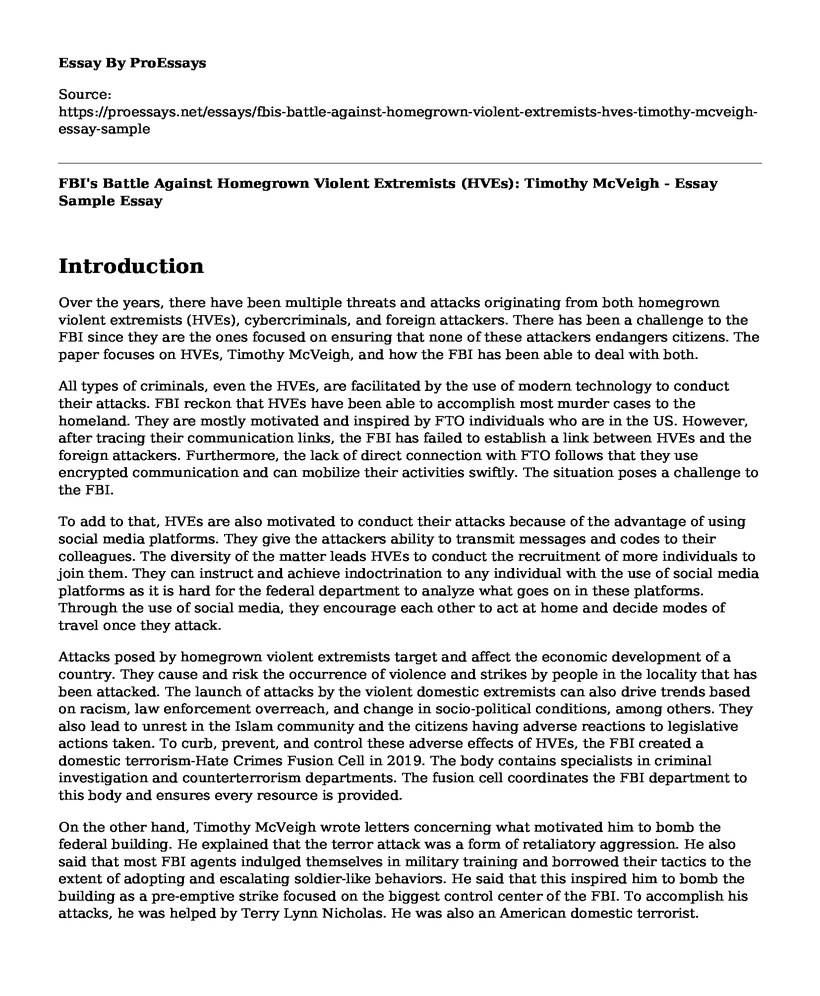Introduction
Over the years, there have been multiple threats and attacks originating from both homegrown violent extremists (HVEs), cybercriminals, and foreign attackers. There has been a challenge to the FBI since they are the ones focused on ensuring that none of these attackers endangers citizens. The paper focuses on HVEs, Timothy McVeigh, and how the FBI has been able to deal with both.
All types of criminals, even the HVEs, are facilitated by the use of modern technology to conduct their attacks. FBI reckon that HVEs have been able to accomplish most murder cases to the homeland. They are mostly motivated and inspired by FTO individuals who are in the US. However, after tracing their communication links, the FBI has failed to establish a link between HVEs and the foreign attackers. Furthermore, the lack of direct connection with FTO follows that they use encrypted communication and can mobilize their activities swiftly. The situation poses a challenge to the FBI.
To add to that, HVEs are also motivated to conduct their attacks because of the advantage of using social media platforms. They give the attackers ability to transmit messages and codes to their colleagues. The diversity of the matter leads HVEs to conduct the recruitment of more individuals to join them. They can instruct and achieve indoctrination to any individual with the use of social media platforms as it is hard for the federal department to analyze what goes on in these platforms. Through the use of social media, they encourage each other to act at home and decide modes of travel once they attack.
Attacks posed by homegrown violent extremists target and affect the economic development of a country. They cause and risk the occurrence of violence and strikes by people in the locality that has been attacked. The launch of attacks by the violent domestic extremists can also drive trends based on racism, law enforcement overreach, and change in socio-political conditions, among others. They also lead to unrest in the Islam community and the citizens having adverse reactions to legislative actions taken. To curb, prevent, and control these adverse effects of HVEs, the FBI created a domestic terrorism-Hate Crimes Fusion Cell in 2019. The body contains specialists in criminal investigation and counterterrorism departments. The fusion cell coordinates the FBI department to this body and ensures every resource is provided.
On the other hand, Timothy McVeigh wrote letters concerning what motivated him to bomb the federal building. He explained that the terror attack was a form of retaliatory aggression. He also said that most FBI agents indulged themselves in military training and borrowed their tactics to the extent of adopting and escalating soldier-like behaviors. He said that this inspired him to bomb the building as a pre-emptive strike focused on the biggest control center of the FBI. To accomplish his attacks, he was helped by Terry Lynn Nicholas. He was also an American domestic terrorist.
They carried out their strike using a home-made bomb. It was a mixture of fertilizers and chemicals, and that is what attacked to be huge. Although the attack seemed to be a success to both domestic terrorists, they left many loose-ends as there were multiple witnesses. Also, the chemicals used in the bombs were used as evidence and were quickly linked to Timothy McVeigh. Similar chemical residue collected at the building after the explosion were found on Mr. McVeigh's clothes after he was arrested. An FBI agent John Hersley confirmed the evidence and provided the court with a witness, a meter maid who said that he had seen a man resembling Timothy near the federal building before the explosion. Another witness testified that he had seen a yellow truck similar to that Timothy was arrested in leaving the scene after the blast. Another witness said that a man identical to Timothy was seen riding the Ryder truck that delivered the explosives. Through this, he was able to be figured out and identified.
Cite this page
FBI's Battle Against Homegrown Violent Extremists (HVEs): Timothy McVeigh - Essay Sample. (2023, Jun 22). Retrieved from https://proessays.net/essays/fbis-battle-against-homegrown-violent-extremists-hves-timothy-mcveigh-essay-sample
If you are the original author of this essay and no longer wish to have it published on the ProEssays website, please click below to request its removal:
- Reflection Paper Over New Jack by Ted Conover
- Essay Sample on Eisenhower's Address: Mixed Feelings About Brown v. Board
- Essay on South Australia Supreme Court Dismisses Public Advocate Appeal
- Essay on Wi-Fi Security: Strategies to Protect Corporate Networks From Unauthorized Access
- Essay Example on Global Refugee Crisis: 44,000 Displaced Persons Daily in 2017
- Paper Example on Reconstruction in America: Rebuilding After Civil War & WW2
- Essay Example on Computer Security Policies







